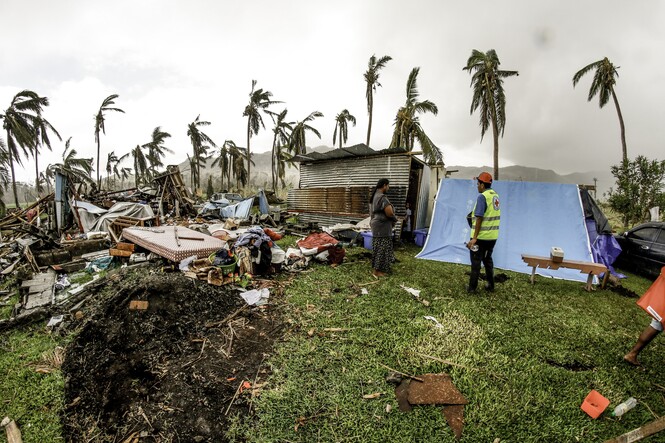
At COP 27, we are calling for urgent action to be taken to strengthen and implement laws, policies and plans across climate and environment, disaster risk reduction and development agendas at national and international levels.
Isabelle Granger, Global Lead, Disaster Law and Auxiliary Role at IFRC, says that strong disaster and climate laws form the foundation of disaster risk management systems that respond to hazards, regulate early action, help reduce risk, involve everyone, and enable a response that quickly reaches those most in need.
“Integration of disaster risk reduction and climate change adaptation happens through strong and well-implemented disaster and climate risk management laws, policies and plans.
“This integration ensures coherence and stronger coordination, which enables concrete impacts on the ground and reduces the impacts of disasters keeping communities safe and saving lives.”
Our call to action
We call on governments and stakeholders to:
- Prioritise and support the strengthening of disaster and climate risk governance. Strengthened disaster and climate risk governance at national, regional and local levels is critical to manage increased weather-related risks we are facing. This includes involving communities in the design and implementation of laws and solutions that enable urgent climate action and facilitating climate finance to enable them to do this critical work.
- Develop and implement consistent and effective climate and disaster-related laws, policies and plans. This includes aligning laws and systems across the humanitarian, development, environment and climate sectors to ensure coherence, definition of roles and responsibilities of all actors, stronger coordination and facilitate the implementation of concrete solutions on the ground.
- Address the needs of the most vulnerable and marginalised people and communities in legal frameworks, including people facing crises and those displaced, so that they are reached, informed and included in global, national and local decisions and plans, and their needs are met.
Strengthening climate-smart disaster law
Around the world, IFRC and National Red Cross Red Crescent Societies work with governments to strengthen disaster and climate risk governance at national and local levels.
In the Pacific, where communities are at the forefront of climate change and disasters, we have strong and long-term relationships with Pacific agencies. With the Pacific Islands Forum Secretariat, through a Memorandum of Understanding signed in 2014, we support technical reviews of national disaster legislation and climate-smart disaster training initiatives for Pacific legislative drafters and national disaster management offices or national emergency management offices.
In Fiji, for example, IFRC and Fiji Red Cross has worked with the National Disaster Management Office and the government to review their 1998 Disaster Management Act and 1995 Disaster Management Plan. During this time a draft Climate Change Bill has also been developed and enacted into law. The shared themes of the Fiji Climate Change Act 2021 and the draft Disaster Risk Management Bill are: a people-centred approach, emphasis on risk-informed approaches and strengthening of Fiji's resilience.
Another small island developing state, Saint Lucia, faces a very high level of disaster risk from tropical cyclones, flooding and landslides to earthquakes and volcanic activity. In addition, changing climate conditions have produced extreme heat, sea level rise, coastal erosion, droughts and increased water stress. Saint Lucia Red Cross Society with the support of IFRC Disaster Law, provided assistance to the government of Saint Lucia to develop its national regulatory frameworks for climate-smart disaster risk management to meet the needs of the most vulnerable and engage local communities, and build the capacity of key stakeholders working in disaster risk reduction and climate change adaptation.
In Uganda, Uganda Red Cross continues to advocate for the development of a climate-smart disaster risk management law, working to support the office of the Prime Minister in developing this law. In addition, the National Climate Change Act 2021 has provided a platform for public discussion in Uganda about climate change and disaster risk management. Before the Act was passed by Parliament, a policy dialogue was held to help local communities and other key climate change actors fully understand the bill and prepare for implementation once it was passed into law.
Read more in our case studies on our work strengthening disaster and climate governance, including; Fiji and the Pacific, the Philippines, and Asia, Malawi, Uganda and Africa, and Saint Lucia.
As the global leader in climate-smart disaster law, IFRC Disaster Law stands ready to support governments to develop and implement coherent and efficient legal systems. IFRC has 20 years of advising law and policymakers on disaster laws, policies and plans. In partnership with National Red Cross and Red Crescent Societies, we have provided support in more than 95 countries.